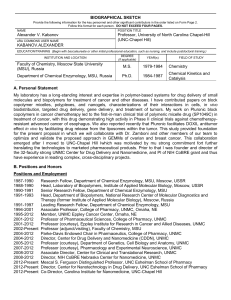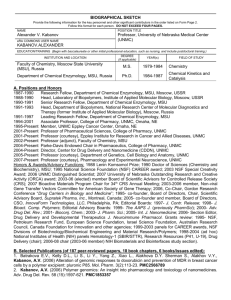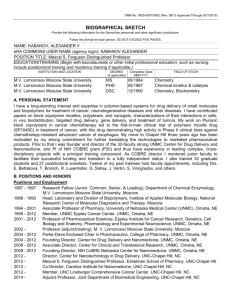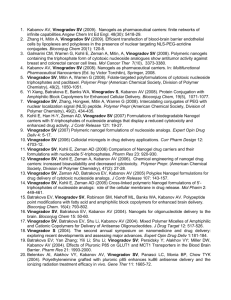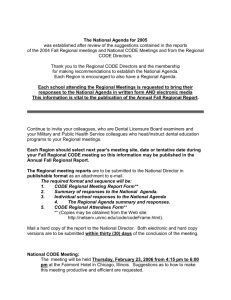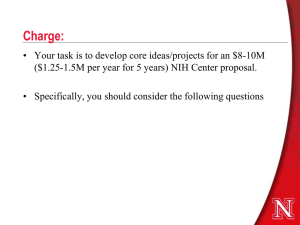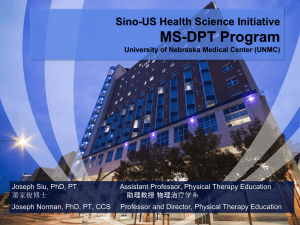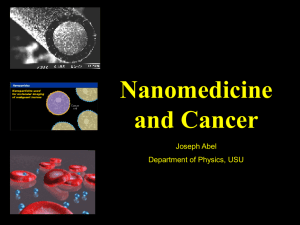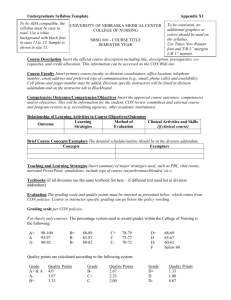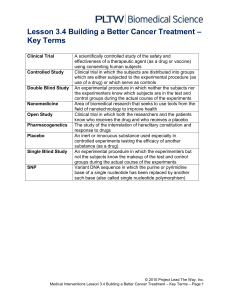biographical sketch - Center for Drug Delivery and Nanomedicine
advertisement
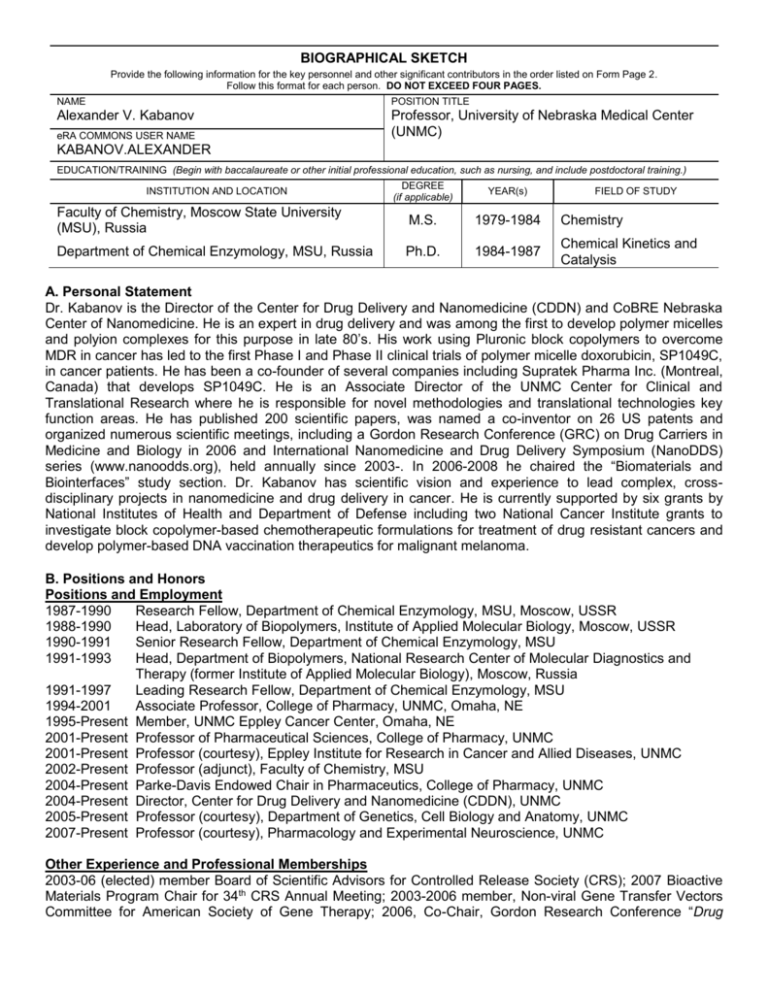
BIOGRAPHICAL SKETCH Provide the following information for the key personnel and other significant contributors in the order listed on Form Page 2. Follow this format for each person. DO NOT EXCEED FOUR PAGES. NAME POSITION TITLE Alexander V. Kabanov Professor, University of Nebraska Medical Center (UNMC) eRA COMMONS USER NAME KABANOV.ALEXANDER EDUCATION/TRAINING (Begin with baccalaureate or other initial professional education, such as nursing, and include postdoctoral training.) DEGREE (if applicable) YEAR(s) Faculty of Chemistry, Moscow State University (MSU), Russia M.S. 1979-1984 Chemistry Department of Chemical Enzymology, MSU, Russia Ph.D. 1984-1987 Chemical Kinetics and Catalysis INSTITUTION AND LOCATION FIELD OF STUDY A. Personal Statement Dr. Kabanov is the Director of the Center for Drug Delivery and Nanomedicine (CDDN) and CoBRE Nebraska Center of Nanomedicine. He is an expert in drug delivery and was among the first to develop polymer micelles and polyion complexes for this purpose in late 80’s. His work using Pluronic block copolymers to overcome MDR in cancer has led to the first Phase I and Phase II clinical trials of polymer micelle doxorubicin, SP1049C, in cancer patients. He has been a co-founder of several companies including Supratek Pharma Inc. (Montreal, Canada) that develops SP1049C. He is an Associate Director of the UNMC Center for Clinical and Translational Research where he is responsible for novel methodologies and translational technologies key function areas. He has published 200 scientific papers, was named a co-inventor on 26 US patents and organized numerous scientific meetings, including a Gordon Research Conference (GRC) on Drug Carriers in Medicine and Biology in 2006 and International Nanomedicine and Drug Delivery Symposium (NanoDDS) series (www.nanoodds.org), held annually since 2003-. In 2006-2008 he chaired the “Biomaterials and Biointerfaces” study section. Dr. Kabanov has scientific vision and experience to lead complex, crossdisciplinary projects in nanomedicine and drug delivery in cancer. He is currently supported by six grants by National Institutes of Health and Department of Defense including two National Cancer Institute grants to investigate block copolymer-based chemotherapeutic formulations for treatment of drug resistant cancers and develop polymer-based DNA vaccination therapeutics for malignant melanoma. B. Positions and Honors Positions and Employment 1987-1990 Research Fellow, Department of Chemical Enzymology, MSU, Moscow, USSR 1988-1990 Head, Laboratory of Biopolymers, Institute of Applied Molecular Biology, Moscow, USSR 1990-1991 Senior Research Fellow, Department of Chemical Enzymology, MSU 1991-1993 Head, Department of Biopolymers, National Research Center of Molecular Diagnostics and Therapy (former Institute of Applied Molecular Biology), Moscow, Russia 1991-1997 Leading Research Fellow, Department of Chemical Enzymology, MSU 1994-2001 Associate Professor, College of Pharmacy, UNMC, Omaha, NE 1995-Present Member, UNMC Eppley Cancer Center, Omaha, NE 2001-Present Professor of Pharmaceutical Sciences, College of Pharmacy, UNMC 2001-Present Professor (courtesy), Eppley Institute for Research in Cancer and Allied Diseases, UNMC 2002-Present Professor (adjunct), Faculty of Chemistry, MSU 2004-Present Parke-Davis Endowed Chair in Pharmaceutics, College of Pharmacy, UNMC 2004-Present Director, Center for Drug Delivery and Nanomedicine (CDDN), UNMC 2005-Present Professor (courtesy), Department of Genetics, Cell Biology and Anatomy, UNMC 2007-Present Professor (courtesy), Pharmacology and Experimental Neuroscience, UNMC Other Experience and Professional Memberships 2003-06 (elected) member Board of Scientific Advisors for Controlled Release Society (CRS); 2007 Bioactive Materials Program Chair for 34th CRS Annual Meeting; 2003-2006 member, Non-viral Gene Transfer Vectors Committee for American Society of Gene Therapy; 2006, Co-Chair, Gordon Research Conference “Drug Carriers in Biology and Medicine”; 1995- co-founder, Board of Directors, Chair, Scientific Advisory Board, Supratek Pharma, Inc., Montreal, Canada; 2005- co-founder and member, Board of Directors, CSO, InnovaForm Technologies, LLC, Philadelphia, PA; Editorial Boards: 1997- J. Contr. Release; 1998- J. Bioact. Comp. Polymers; Editorial Advisory Boards: 1999- The AAPS J. (previously PharmSci); 2000- Adv. Drug Del. Rev.; 2001- Bioconj. Chem.; 2003- J. Pharm. Sci.; 2005- Int. J. Nanomedicine; 2006- Section Editor, Drug Delivery and Developmental Therapeutics J. Neuroimmune Pharmacol. Grants review: 1995- NSF, Petroleum Research Fund, European Science Foundation, Israel Science Foundation, Australian Research Council, Canada Foundation for Innovation and other agencies; 1999-2003 panels for CAREER awards, NSF Divisions of Biotechnology/Biochemical Engineering and Material Research/Polymers; 1998-2004 (ad hoc) National Institutes of Health (NIH) panels Hematology-1 (SBIR/STTR), Research Resources (P41, U-19), Drug Delivery (chair); 2006-08 chair (2003-06 member) NIH Biomaterials and Biointerfaces study section), 2010 NCI Special Emphasis Panel for NCI Centers of Cancer Nanotechnology Excellence I. Honors 1988 Lenin Komsomol Prize; 1990 Doctor of Sciences (Chemistry and Biochemistry), MSU; 1995 National Science Foundation (NSF) CAREER award; 2003 NSF Special Creativity Award; 2006 UNMC Distinguished Scientist; 2007 University of Nebraska Outstanding Research and Creative Activity (ORCA) award; 2009 UNMC Scientist Laureate C. Selected Peer-Reviewed Publications (Selected from 200 peer-reviewed publications): Most relevant to the current application 1. Minko, T., Batrakova, E.V., Li, S., Li, Y., Pakunlu, R.I., Alakhov, V.Y., Kabanov, A.V. (2005) Pluronic block copolymers alter apoptotic signal transduction of doxorubicin in drug-resistant cancer cells, J. Control. Release 105(3):269-78. 2. Batrakova, E.V., Kabanov, A.V. (2008) Pluronic block copolymers: Evolution of drug delivery concept from inert nanocarriers to biological response modifiers, J. Control. Release, 130(2):98-106. Epub 2008 Apr 24. PMCID: PMC2678942 3. Alakhova, D.Y., Rapoport, N.Y., Batrakova, E.V., Timoshin, A.A., Li, S., Nicholls, D., Alakhov, V.Y., Kabanov, A.V. (2010) Differential metabolic responses to pluronic in MDR and non-MDR cells: A novel pathway for chemosensitization of drug resistant cancers. J. Control. Release 142(1):89-100 Epub 2009 Oct 6. NIHMSID # 156599 4. Batrakova, E.V., Li, S., Brynskikh, A.M., Sharma, A.K., Li, Y., Boska, M., Gong, N., Mosley, R.L., Alakhov, V.Y., Gendelman, H.E., Kabanov, A.V. (2010) Effects of Pluronic and Doxorubicin on drug uptake, cellular metabolism, apoptosis and tumor inhibition in animal models of MDR cancers, J. Control. Release. Epub 2010 Jan 13. NIHMSID # 181167 5. Sahay, G., Kim, J.O., Kabanov, A.V., Bronich T.K. (2010) The exploitation of differential endocytic pathways in normal and tumor cells in the selective targeting of nanoparticulate chemotherapeutic agents. Biomaterials 31(5), 923-33. Epub 2009 Oct 22. NIHMSID # 151102 Additional recent publications of importance to the field (in chronological order) 6. Bronich, T.K., Keifer, P.A., Shlyakhtenko, L.S., Kabanov, A.V (2005) Polymer micelle with cross-linked ionic core. J. Am. Chem. Soc. 127(23):8236-7. 7. Batrakova, E.V., Kelly, D.L., Li, S., Li, Y., Yang, Z., Xiao, L., Alakhova, D.Y., Sherman, S., Alakhov, V.Y., Kabanov, A.V. (2006) Alteration of genomic responses to doxorubicin and prevention of MDR in breast cancer cells by a polymer excipient: pluronic P85. Mol. Pharm. 3(2):113-23. 8. Kabanov, A.V., Gendelman, H.E. (2007) Nanomedicine in the diagnosis and therapy of neurodegenerative disorders, Progr. Polym. Sci. 32(8-9):1054-82. NIHMSID # 109893 9. Sahay, G, Batrakova, E.V., Kabanov, A.V. (2008) Different internalization pathways of polymeric micelles and unimers and their effects on vesicular transport. Bioconjug. Chem., 19(10):2023-9. PMCID: PMC2575076 10. Sharma, A.K., Zhang, Li., Li, S., Kelly, D.L., Alakhov, V.Yu., Batrakova, E.B., Kabanov, A.V. (2008) Prevention of MDR development in leukemia cells by micelle-forming polymeric surfactant. J. Control. Release, 131(3):220-7. PMCID: PMC2711209 11. Wang, F., Bronich, T.K., Kabanov, A.V., Rauh, R.D., Roovers, J. (2008) Synthesis and characterization of star poly(epsilon-caprolactone)-b-poly(ethylene glycol) and poly(L-lactide)-b-poly(ethylene glycol) copolymers: evaluation as drug delivery carriers. Bioconjug. Chem. 19(7):1423-9. Epub 2008 Jun 20. PMCID: PMC2711207 12. Yang, Z., Sahay, G., Sriadibhatla, S., Kabanov, A.V. (2008) Amphiphilic block copolymers enhance cellular uptake and nuclear entry of polyplex-delivered DNA. Bioconjug. Chem., 19(10):1987-94. PMCID: PMC2574534 13. Gaymalov, Z.Z, Yang, Z, Pisarev, V.M., Alakhov, V.Yu., Kabanov, A.V. (2009) The effect of the nonionic block copolymer pluronic P85 on gene expression in mouse muscle and antigen-presenting cells, Biomaterials, 30 (6): 1232-45. Epub 2008 Dec 6. PMCID: PMC2667955 14. Kabanov, A.V., Vinogradov, S.V. (2009) Nanogels as pharmaceutical carriers: Finite networks of infinite capabilities. Angew. Chem. Int. Ed. Engl. Jun 27;48(30):5418-5429. NIHMSID # 149084 15. Sahay, G., Gautam, V., Luxenhofer, R., Kabanov, A.V. (2010) The utilization of pathogen-like cellular trafficking by single chain block copolymer. Biomaterials 31(7):1757-64. Epub 2009 Dec 5. NIHMSID # 164497 D. Research Support Ongoing Research Support COBRE: “Nebraska Center for Nanomedicine” Principal Investigator: A.V. Kabanov Agency: NIH Type: 1P20RR021937-01A2 Period: 09/26/08 – 06/30/13 This proposal seeks to develop an interdisciplinary Nanomedicine Center at the University of Nebraska Medical Center (UNMC). We have assembled a team of scientists with specific expertise in nanomedicine, drug delivery, therapeutics and diagnostics. These will now be joined by biochemists, pharmacologists, immunologists and neuroscientists. All will work, with singular focus, to develop the means to best use devices of nanoscale size to improve outcomes for cancer, neurodegenerative and cardiovascular diseases. Such approaches will deliver drugs to focal areas of central nervous system disease or directly to tumors. Parallel studies seek nanotechnologies to improve diagnostic measures and disease monitoring. Within the Center up to five junior project leaders are provided with research funds, experienced mentoring, and support of Bioimaging and Nanomaterial core facilities. The Center also supports recruitment of faculty to UNMC working in the Nanomedicine field. The long-term goals are to build upon and integrate already strong areas of research in cancer biology, neurodegenerative disorders, molecular imaging (magnetic resonance and single photon emission computed tomography) with material and pharmaceutical sciences (nanomaterials, polymers, drug delivery, and gene delivery). The envisioned cross-disciplinary expertise could be joined between traditional biomedical research and material sciences through the Center. There is no overlap with any of Dr. Kabanov’s research projects. “Polymer based gene delivery” Principal Investigator: A.V. Kabanov Agency: NIH NCI Type: R01 CA116591-04 Period: 5/1/06 – 4/30/11 Co-administration of nonionic poly (ethylene oxide)-poly(propylene oxide) block copolymers (Pluronic) has greatly increased the trangene expression of the plasmid DNA in the muscle. These block coplymers were shown to be safe in human clinical trials for cancer chemotheray, which supports their evaluation for possible use in gene therapy. The objectives of the proposal are 1) to determine most efficient Pluronic compositions for plasmid DNA delivery in the muscle, 2) to determine the mechanism by which Pluronic enhances transgene expression, and 3) to evaluate this system for delivery of DNA vaccines targeting malignant melanoma. "Polypeptide modification for enhanced brain delivery" Principal Investigator: A.V. Kabanov Agency: NIH NINDS Type: RO1 NS051335-03 Period: 2/15/06 - 1/30/10 (no cost) Competitive renewal is being awarded The objective of this proposal is to enhance delivery of leptin to the brain to control obesity. The aims (1) use horseradish peroxidase (HRP) as a model to optimize the covalent modifications of polypeptides with fatty acids and block copolymers to increase protein permeability across the blood brain barrier (BBB); (2) determine the mechanism by which these modifications enhance BBB permeability; (3) determine in vivo the extent of the accumulation by brain of modified HRP and leptin; (4) determine the extent to which modified leptins retain biological activity after both peripheral administration and direct injection into brain. "Interactions of Pluronic Block Copolymers in Drug Resistant Cancers" Principal Investigator: A.V. Kabanov Agency: NIH NCI Type: RO1 CA89225-07 Period: 7/01/01-4/30/12 The objective of this proposal is to determine the mechanisms through which Pluronic sensitizes the drug resistant cancer cells. The aims (1) characterize the effects of Pluronic on ATP levels in resistant and sensitive cells; (2) identify drug/Pluronic formulations effective against resistant cancers; (3) determine whether the effects of Pluronic on the energy state of the cell inhibit the functional activity of specific drug resistance mechanisms; and (4) determine factors important for the efficient delivery of Pluronic to the tumor cells in vivo. “Non-invasive nanodiagnostics of cancer (NINOC)” Principal Investigator: A.V. Kabanov Agency: DoD Type: USAMRMC 06108004 Period: 4/01/07-04/30/11 (no cost) This project will develop a platform nanotechnology to deliver imaging and diagnostic agents to the cancer cells. The hydrophilic polymer nanogels of core-shell morphology are designed to entrap different types of probes used in SPECT, CT, MR or luminescence detection. The surface of the nanogels is modified with genetically engineered antibody fragments to target the surface of cancer cells and provide site-specific delivery of the nanogels to tumors in the body. “Synthetic Nanovaccines Against Respiratory Pathogens (SYNARP)” Principal Investigator: A.V. Kabanov Agency: DoD Type: W81XWH-09-1-0386 Period: 7/01/09-06/30/13 The overall goal of this proposal is to develop fully synthetic vaccines against respiratory infections using novel nanotechnology platforms based on safe and degradable adjuvant polymer systems that enhance antigen presentation and stimulate immunity. The proposal focuses on achieving the following specific technical objectives: 1) Develop molecular methods for intervention strategies employing novel synthetic nanovaccine platforms encapsulating DNA and protein/peptide antigens that elicit immune response against influenza H5N1; 2) Test the efficacy of nanovaccines-based intervention regimens against influenza H5N1 in animal models. Completed Research Support "Interactions of Block Copolymers in Blood Brain Barrier" Principal Investigator: A.V. Kabanov Agency: NIH NINDS Type: RO1 NS36229-09 Period: 9/15/97 - 6/30/09 The objective of this proposal is to enhance the brain delivery of drugs across the BBB using Pluronic. Using brain microvessel endothelial cells as an in vitro model of the BBB, and using in vivo tissue sampling in mice, the aims (1) characterize the mechanism of Pgp inhibition in BBB; (2) examine the extent to which Pluronic effects can alter other carrier systems in BBB; (3) Examine the extent to which Pluronic can alter vesicular transport in BBB and, (4) determine how Pluronic affects delivery of drugs to the brain in vivo. "Structure and Dynamics of Block Ionomer Complexes” Principal Investigator: A.V. Kabanov Agency: NSF Type: DMR-0513699 Period: 6/01/05-5/31/09 The major goal of this project is to explore dispersed composite nanomaterials which represent 1) micelle-like aggregates with the polyion complex core and hydrophilic; 2) micelles with a hydrophobic cores and polyion complex corona. The work focuses on the reactions of polyelectrolyte interchange involving these materials and utilizes variety of experimental and theoretical approaches to determine the rates of these reactions and understand the contribution of the core-shell architecture to the dynamic properties of these materials. Additional information: 26 US patents awarded.
